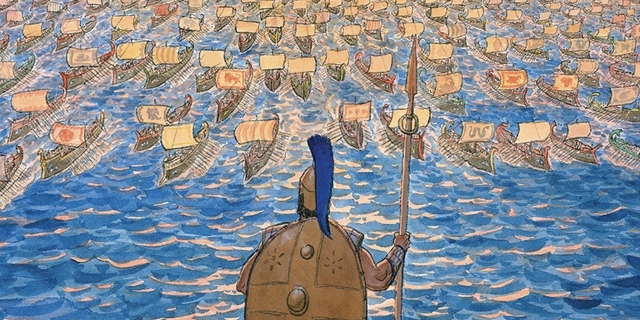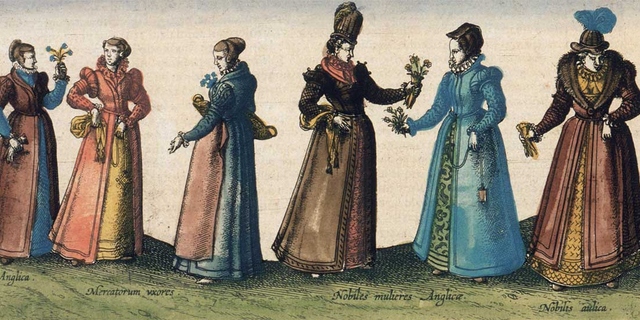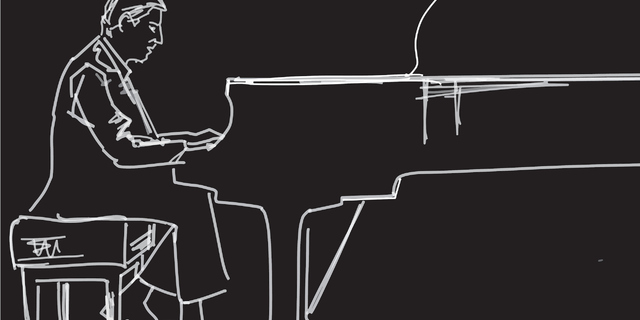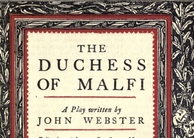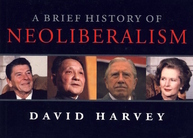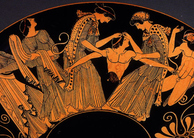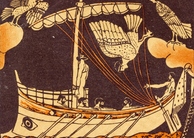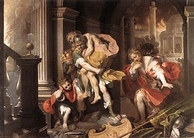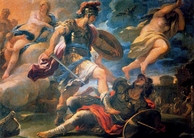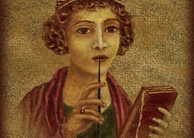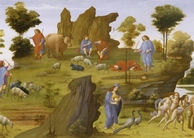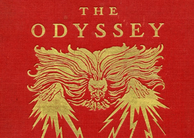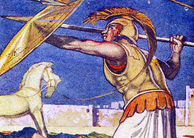|
Class (tagged articles)
The keyword Class is tagged in the following 27 articles.
2021, Vol. 13 No. 12
This research elucidates the striking parallelism between the Hindu Varna System and Plato's Magnificent Myth through an unorthodox view of their Class-based Classification, social mobility, and meritocracy while arguing that these stem from the... Read Article »
2021, Vol. 13 No. 10
Early medieval Irish society operated on an elaborate power structure formalized by law, practiced through social interaction, and maintained by tacit exploitation of the lower orders. This paper investigates the materialization of Class hierarchies... Read Article »
2021, Vol. 13 No. 02
Although most Ancient Greek literature focused on male characters, a literary analysis of Homeric poetry reveals an inquisition of femininity, motherhood, and what it meant to be a woman in Ancient Greece. Throughout the epic The Iliad and its sequel... Read Article »
2021, Vol. 13 No. 01
The inescapability and influence of the past becomes most discernable with homecoming. A particularly powerful sense of nostalgia concentrates in textiles, especially when these objects purposefully invoke the past. More often than not, theatre... Read Article »
2020, Vol. 12 No. 12
While the music of Johann Sebastian Bach is often characterized by elaborate Baroque counterpoint and a relatively conservative set of aesthetic principles, elements of the emergent galant fashion are exemplified in certain mid-to-late career compositions... Read Article »
2020, Vol. 12 No. 10
Colorism or skin tone bias is a form of discrimination based on skin tone that typically awards advantages to light-skinned people while penalizing dark-skinned people within an ethnic group. There is very little research on colorism in higher education... Read Article »
2020, Vol. 2020 No. 1
Time has always been an abstract concept in human languages. To better understand how this temporal concept is addressed in different languages, it can be explored in the context of Classical times through Latin texts. In the well-known piece The... Read Article »
2019, Vol. 11 No. 01
The staged plays of the early Jacobean period are valuable textual products for the literary critic, the cultural researcher and the historian alike. These plays are significant containers of knowledge about the mutually reinforcing social and political... Read Article »
2017, Vol. 9 No. 02
Commonly believed to be the single greatest writer and poet of the English language, as well as one of the most distinguished and esteemed dramatists in the entire world, William Shakespeare is credited with authoring approximately 38 works of theatre... Read Article »
2016, Vol. 8 No. 04
Social and economic wellbeing are not simply determined by the choices one makes. Social Class and poverty display consistent patterns across groups and generations making social mobility and economic success difficult in individual lives. But there... Read Article »
2016, Vol. 8 No. 02
This study was designed to explore current issues of access, interests and attitudes towards technology use in STEM related courses for a population of middle school students enrolled at a Title I urban school in the South. The participants in the... Read Article »
2016, Vol. 8 No. 02
Michael Thompson, reviewing A Brief History of Neoliberalism by David Harvey, calls it ‘the world according to David Harvey’ (2005). This is an accurate remark: although erring slightly on the side of conspiracy, the book is a breathtaking... Read Article »
2015, Vol. 7 No. 10
In Euripides’ Bacchae, careful examination of the character Dionysus illuminates discrepancies in action based on gender. Ultimately, Dionysus’ effeminate nature compounded with his subversive measures toward women and male proclivities... Read Article »
2015, Vol. 7 No. 03
The defining characteristics of Odysseus in Classical literature are interpreted in wildly different ways by different authors: he is portrayed as a hero in Homer’s The Odyssey, a villain in Sophocles’ Philoctetes, a self-serving opportunist... Read Article »
2007, Vol. 2 No. 1
It is common to think of mythical heroes as being "larger than life." The stories of their legendary pursuits put these warriors on a level above that of the mere common man. The cosmic insignificance of the normal human being is also suggested... Read Article »
2009, Vol. 5 No. 2
With these haunting final words, the young queen of Virgil's Aeneid, Dido, takes her life on a flaming pyre of her lover's belongings. The death of Dido is one of the most poignant moments in Classical literature. Dido begins as an independent queen... Read Article »
2011, Vol. 3 No. 10
Shakespeare’s comedies, at first glance, seem to uniformly end on a positive note, with the fulfillment of desires, the overcoming of obstacles, and the victory over malevolent forces. In Twelfth Night and Measure for Measure, however, this... Read Article »
2011, Vol. 3 No. 03
As many cultural studies theorists have noted, identity is problematic (Hall, 1989; Ang, 2001; Brah, 1996). It is ambiguous because it is in a constant state of negotiation and interpretation: ever changing, always contested, sometimes contradictory... Read Article »
2011, Vol. 3 No. 02
In the Aeneid, Virgil depicts the struggle of the newly displaced Trojans to find a new home, under the leadership of Aeneas. The Trojans, having only recently lost the Trojan War to the Greeks, travel in search of a new home, eventually settling... Read Article »
2011, Vol. 3 No. 02
Reading Greek plays provides valuable insight into the relationships between gods and humans. While both gods and humans have fairly similar personalities Greek gods have a certain amount of power that, given motivation from an arrogant mortal,... Read Article »
2011, Vol. 3 No. 01
The mere mention of the English Language Arts content area, for many people, might conjure images of ancient, dusty tomes, the sound of a Classroom full of pens scratching across college-ruled paper, or the palpable befuddlement of students staring... Read Article »
2010, Vol. 2 No. 11
Gifted learners, although possessing higher levels of intelligence than their peers, are disadvantaged in the sense that they frequently do not, or are not given the opportunity, to reach their full potential (Farmer, 1993). Krause, Bochner and... Read Article »
2010, Vol. 2 No. 03
In America, the years from 1946 to 1962, labeled the “post Classical era” of cinema, were years in a state of transition. American culture was simply unstoppable and alive, constantly changing and growing toward a more open society.... Read Article »
2010, Vol. 2 No. 01
Oppression tends to exist in compartmentalized, clearly labeled categories of race, social Class, gender, or sexual preference. While these rigidly defined categories may have been applied to allow for rational discussion of problems and solutions... Read Article »
2009, Vol. 1 No. 12
The number of ancient sources available to the readers and playwrights of Elizabethan times was truly immeasurable. These sources could be reached both as original texts in Greek and Latin, and in French and English translations. Popular indirect... Read Article »
2009, Vol. 1 No. 11
Even in fairy tales and fantastical legends, the trespassing of the breathing upon the domain of the spirits is rare. It is a disturbing idea; when the dead visit our world, we can at least find comfort in numbers. Yet the hero Odysseus braves the... Read Article »
2009, Vol. 1 No. 11
Why raise the curtain on this 45 day by 45 night saga? In a story whose ending everybody knows already, why choose these actions of these characters to expound upon? The Iliad is not a war tale one might tell in which friends love friends,... Read Article »
Expedited Article Review
Submit an article and get a decision fast.
If you need a fast decision, INQUIRIES Journal offers expedited processing of your submission for a small fee. Depending on the expedited review option you choose, you can receive a decision in as few as 5-days.
In addition to a shorter review period, the fee supports the journal's continued operation and open-access publishing model. Standard submissions are always free. Submit Now » - Submit an Article to Inquiries Journal -
|



